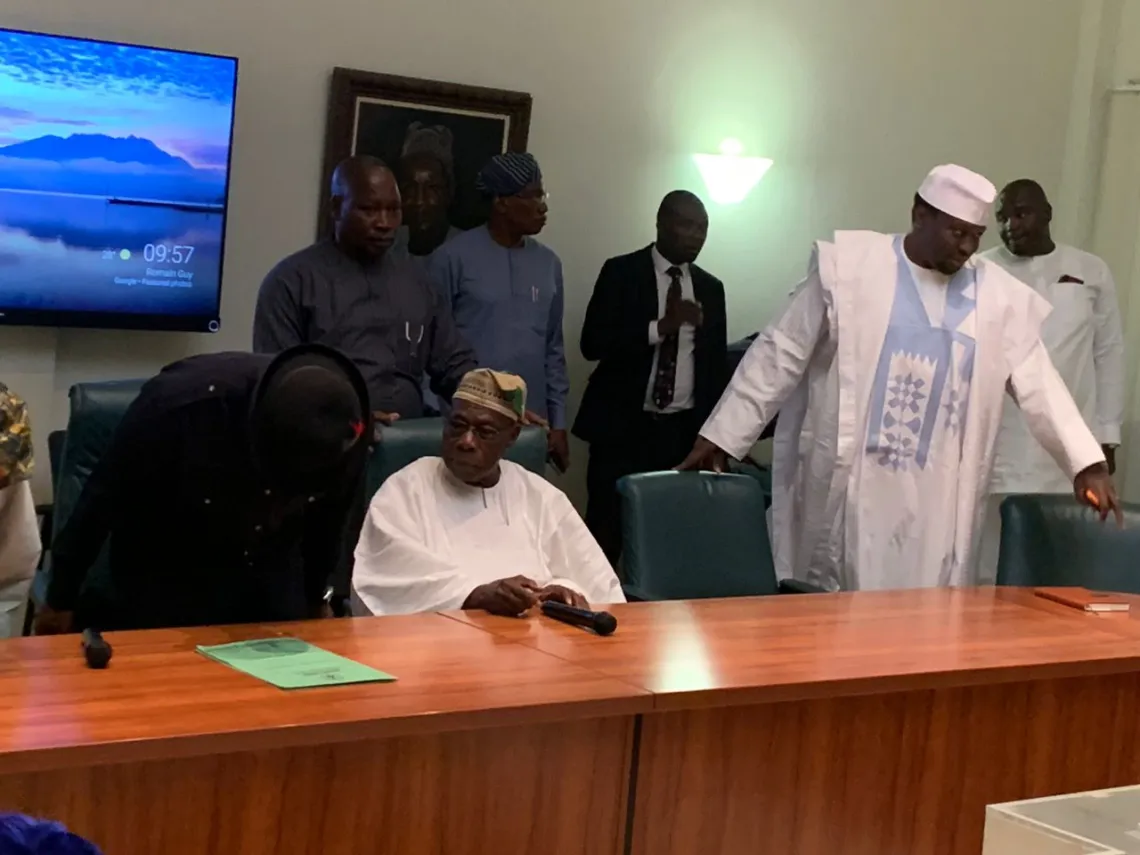PAG Felicitates Muslims on Commencement of Ramadan Fast
February 18, 2026TOP TEN MUSLIM UNIVERSITIES IN AFRICA
February 14, 2026ANALYSIS: Why Nigeria GDP is not the best in Africa Despite having the largest market
February 10, 2026Obasanjo Says Africa Makes Mistake Adopting Western Liberal Democracy
Obasanjo Says Africa Makes Mistake Adopting Western Liberal Democracy

Former President Olusegun Obasanjo has said African countries including Nigeria made a mistake by adopting the western liberal democracy.
Chief Obasanjo stated this on Monday when members of the House of Representatives championing the reintroduction of the parliamentary system of government in the country, met with him in Abuja.
The lawmakers, under the aegis of the “Parliamentary Group” led by the Minority Leader of the House of Representatives, Kingsley Chinda (PDP, Rivers), met with Chief Obasanjo at the Shehu Yar’Adua Centre in Abuja.
The meeting was part of their advocacy visits to prominent Nigerians to solicit their support for the transitioning of the country from the current presidential system of government to the parliamentary system.Coincidentally, Mr Obasanjo, Nigeria’s military head of state from 1976-1979, midwifed the 1979 Constitution that produced the American presidential system which replaced the parliamentary system practised in the first republic.He was subsequently elected president in 1999 after the return of democracy and was in office for eight years.
Speaking on the state of democracy in Africa, Mr Obasanjo said countries in the continent made the mistake of adopting the western liberal democracy prescribed by the Europeans, stating that the Western liberal democracy is not consistent with the African value system.
“Let me go back to the beginning where we got it wrong—the western liberal democracy, that is what the Europeans have. When you look at the western liberal democracy, it is a product of their history, a product of their culture, a product of their way of life.
“I have looked into most African languages, western democracy has what they call loyal opposition. What is opposition in African languages? Enemy. Western democracies called oppositions “loyal” because the oppositions are loyal to the monarchy. That’s where their loyal democracy began. They used to have monarchies.
“There is nothing in the liberal democracy that is African. We ruled ourselves before the advent of colonialism. We had empires and striving kingdoms. We did not rule ourselves as opposition.
“What is in it for us? I don’t know but you can give it. For lack of an appropriate word, let us call it ‘Afro-democracy.’ That is where we have to begin,” Obasanjo said.
On the proposal by the lawmakers, chief Obasanjo said the legislators are preaching to a convert, stating that he agreed that there is a need for a fundamental shift from the current system.
He, however, warned the lawmakers that they need to have a long-term plan and be tactical in presenting a position.
The former president counseled the lawmakers to drop the tag “parliamentary system”, and should instead push for a homegrown democracy.
“You are preaching to the converted but as I have said, take parliamentary away.
“We need to get the critical masses. Parliamentary and all that—once you start that, you have gotten it wrong. Once you do that, you are putting yourself in a fix because there are those who would say “We don’t want parliamentary,” he said.
Earlier in his opening remarks, Mr Chinda said the use of the word “parliamentary” is due to a lack of a suitable word.He said the system proposed by the lawmakers is “homegrown” and not the textbook definition of the parliamentary system.
Also speaking project, the spokesperson of the group, Abdulsamad Dasuki (PDP, Sokoto), said the group is organising a national dialogue on the project.
According to the lawmaker, the dialogue is scheduled for 1 July.
Meanwhile, the push by the lawmakers, known as the Parliamentary Group, pushing for the transition to a parliamentary system of government.
Nigeria operated under the parliamentary system pre-independence and in the First Republic. However, the coup of 15 January 1966 truncated that republic.
The military suspended the civil government and ruled the country until the transition to democracy in 1979. The Second Republic was built on the 1979 Constitution which prescribed the presidential system.
The proposal by the lawmakers is seeking to revert to the First Republic system with a prime minister, a member of parliament, serving as the head of government, similar to the British system.
In a parliamentary system, the executive branch derives its legitimacy and authority from the legislative branch. The head of government (often the prime minister) is typically a member of the legislature and is accountable to it. This system fosters a close relationship between the executive and legislative branches, allowing for efficient decision-making and policy implementation.
The lawmakers have already sponsored some constitution alteration bills to make the changes in the constitution. However, the timeline for the change is beyond this current Assembly. They have set a target of 2031 as the timeline for achieving the goal.
In the past couple of months, the lawmakers have been moving around the country meeting politicians who served in the Second and Third Republics.
They have met with the Chairman of Northern Elders Forum (NEF), Ango Abdullahi, the Interim National Chairman of APC, Bisi Akande, Sanusi Dantata and others.
END.








